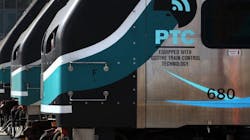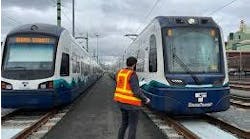All railroads make PTC statutory deadline
Train commuters across the U.S. can breathe a sigh of relief. All passenger trains are running following a statement by the Federal Railroad Administration (FRA) on Dec. 31 that all railroads required by Congress to implement positive train control (PTC) by the end of 2018 have either done so or submitted documentation to qualify for an alternative schedule, which extends the deadline to Dec. 31, 2020.
FRA says four railroads, including the Port Authority Trans-Hudson (PATH), North County Transit District, Portland & Western Railroad and the Southern California Regional Rail Authority (Metrolink), have self-reported full implementation of an FRA-certified and interoperable PTC system.
FRA says another 33 railroads and three tenant-only commuter railroads have submitted a written notification requesting FRA’s review and approval of an alternative schedule and each railroad provided documentation intended to demonstrate they met the six statutory criteria necessary to qualify for an alternative schedule under the Positive Train Control Enforcement and Implementation Act of 2015 (PTCEI Act). New Mexico Rail Runner Express, the 41st railroad, was conditionally approved for a temporary main line track exception by the FRA, which allows the railroad until Dec. 31, 2020, to fully implement a PTC system.
The safety overlay system was mandated by Congress in 2008 and the law carried an original deadline of Dec. 31, 2015. A new law, the PTCEI Act, was passed in late 2015, which extended the statutory deadline to Dec. 31, 2018 and laid out six criteria required of each railroad to meet in order to qualify for an alternative schedule of Dec. 31, 2020. Those criteria include the installation of all PTC system hardware, the acquisition of all spectrum necessary, completion of all employee training where PTC is being field tested or being operated in revenue service demonstration (RSD) or revenue service, made sufficient progress on advanced testing or implementation of PTC, inclusion of an alternative schedule and sequence for implementing a PTC system as soon as practicable, but no later than Dec. 31, 2020 within a railroad's PTC Implementation Plan and certified to FRA in writing that a railroad will be in full compliance on or before the proposed alternative schedule and sequence.
FRA says it has sought to hasten and facilitate the deployment of PTC through numerous venues of outreach and sustained communication in order to help railroads take necessary steps to comply with all statutory and regulatory requirements. FRA and the Federal Transit Administration have awarded more than $470 million in grants since 2017. In 2018, FRA was allocated $250 million for PTC grants. It awarded more than $200 million in August and another $46 million in December.
"The FRA will continue to hold railroads accountable in adhering to their own stated full implementation timetables through rigorous regulatory and programmatic enforcement. To manage the immense task of achieving full system functionality on every railroad, FRA will continue to actively monitor railroads’ compliance with their own required PTC Implementation Plans and help ensure they continue to satisfy and fulfill numerous technological, procedural and operational milestones and benchmarks," FRA said.
FRA noted the significant results 2018 saw in the progress toward implementation of PTC and credited the collaboration between industry and government.
"However, significant work remains to be done in order to ensure additional field testing, interoperability and full implementation arrive as soon as possible," said FRA.

Mischa Wanek-Libman | Group Editorial Director
Mischa Wanek-Libman is director of communications with Transdev North America. She has more than 20 years of experience working in the transportation industry covering construction projects, engineering challenges, transit and rail operations and best practices.
Wanek-Libman has held top editorial positions at freight rail and public transportation business-to-business publications including as editor-in-chief and editorial director of Mass Transit from 2018-2024. She has been recognized for editorial excellence through her individual work, as well as for collaborative content.
She is an active member of the American Public Transportation Association's Marketing and Communications Committee and served 14 years as a Board Observer on the National Railroad Construction and Maintenance Association (NRC) Board of Directors.
She is a graduate of Drake University in Des Moines, Iowa, where she earned a Bachelor of Arts degree in Journalism and Mass Communication.



